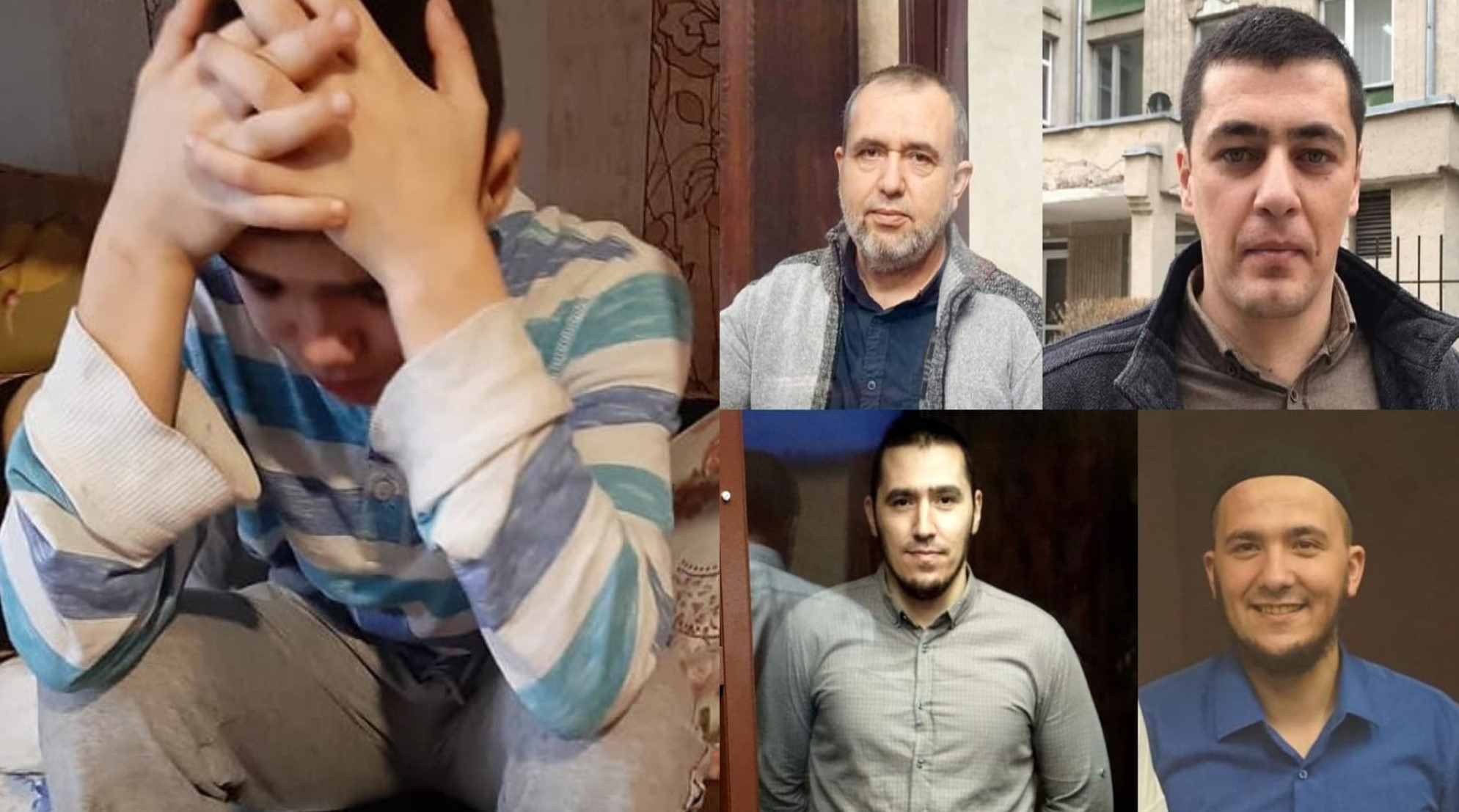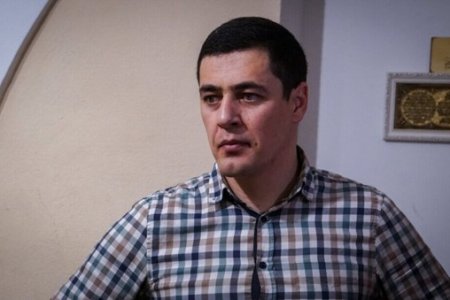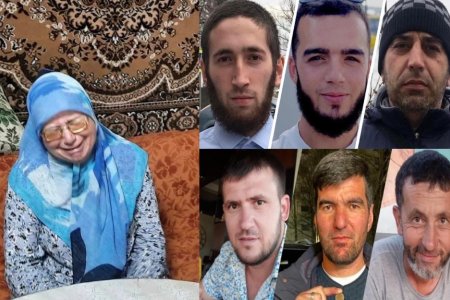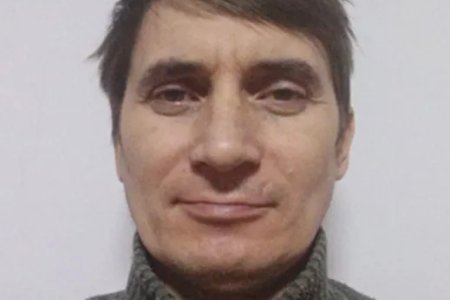
A Russian court of appeal has upheld four monstrous sentences against a Crimean Tatar civic journalist with a life-threatening heart condition and three members of one family. All four were charged with the current Russian regime’s remake of the ‘counter-revolutionary terrorist propaganda’ charges used under Stalin to kill two of the men’s great-grandfather. Not one of the men was accused of a recognizable crime, yet Russian ‘courts’ passed sentences of 55 years in total, with the 12 years passed against Amet Suleimanov an almost certainly swift death sentence. All of the men are recognized political prisoners, whose release has been repeatedly demanded by international bodies and all democratic countries.
The two sons of a renowned Crimean Tatar historian: Seitumer Seitumerov (b. 1988) and his brother, Osman Seitumerov (b. 1992) and their maternal uncle, Rustem Seitmemetov (b. 1973) were taken into custody on 11 March 2020, after armed ‘searches’ by the FSB and other Russian-controlled enforcement bodies in occupied Crimea. These were ‘searches’ in name alone, as the FSB made no pretence of looking for anything criminal and brought the ‘prohibited religious literature’ that they claimed to have ‘found’ with them. Civic journalist Amet Suleimanov (b. 1984) was also initially taken into custody, but the FSB clearly understood that he would not survive till the ‘trial’, and, for the first time, in these conveyor belt cases, asked only for him to be placed under house arrest. That, however, changed once the ‘trial’ at the notorious Southern District Military Court in Rostov (Russia) drew to a close. Prosecutor Igor Nadolinsky, who had previously tried to get Suleimanov remanded in custody, demanded a 13-year sentence, in the full knowledge that he was demanding a death sentence against a man who had committed no crime. The panel of ‘judges’ were also under no illusions when, on 29 October 2021, presiding ‘judge’ Igor Kostin together with Roman Plisko and Yevgeny Zviagin passed four real and very long sentences in the harshest of Russian prison colonies, with the first 3.5 years in each case to be spent in a prison, the absolute worst of Russia’s penal institutions. Seitumer Seitumerov was sentenced to 17 years; his brother Osman Seitumerov – 14 years; their uncle Rustem Seitmemetov – 13 years and Amet Suleimanov – 12 years. The ‘court’ also ordered a further term of restricted liberty after the main sentence - of 1.5 years in Seitumer Seitumerov’s case and 1 year against all three other men. This is probably just the latest template that all so-called judges at the court in Rostov use in these conveyor-belt ‘trials’, rather than a final sneer at Suleimanov who may well not survive the first six months of the prison sentence.
There is no exaggeration here, and it is, in fact, clear that all agents involved in this persecution are aware of the danger. In reporting the rejection on 9 February 2023 by the Military Court of Appeal in Vlasikha (Moscow region) of all four men’s appeals, the Crimean Solidarity human rights initiative noted that Amet Suleimanov had arrived at the ‘court’ (in occupied Crimea) with his things, clearly anticipating that he would be taken into custody. In fact, the penal service staff took him home. He will be taken into custody once the appeal court ruling, passed by presiding ‘judge’ Aleksandr Aleksandrovich Mordovin and two colleagues, comes out in print. Amet’s lawyer, Lilia Hemedzhi was blunt, calling the sentence against a man with his illness pure cynicism. “They’ve sentenced him to die”.
Suleimanov suffers from chronic rheumatic heart disease, aortic insufficiency, coronary artery disease and third level mitral valve prolapse, and urgently needs a heart valve transplant. He had been forced to abandon his civic journalist work for Crimean Solidarity because of his mounting weakness, and, even according to Russian law, his medical conditions should directly preclude his imprisonment.
Seitumer and Osman Seitumerov know all about repression, with several members of two generations having been subjected to persecution, including their great-grandfather who was executed by Stalin’s regime.
The current Russian regime is illegally applying its own repressive legislation in occupied Crimea, and is especially targeting Crimean Tatar civic activists and journalists. The ‘terrorism’ charges in these cases and others have been condemned by international human rights organizations and others as aimed at crushing the Crimean Tatar human rights movement.
There neither was, nor is any ‘terrorism’, with the charges based solely on a highly secretive 2003 Russian Supreme Court ruling which labelled the peaceful pan-Muslim Hizb ut-Tahrir party ‘terrorist’. No explanation was provided then for why an organization not known to have committed acts of terrorism anywhere in the world should be called ‘terrorism’, and until 2016 (when joined by the repressive regime in Uzbekistan) Russia was the only country in the world to take this position. In Ukraine (and most European countries), Hizb ut-Tahrir is legal.
Despite the lack of any grounds and in clear violation of international law which prohibits Russia from applying its legislation on occupied Ukrainian territory, Russia has been imprisoning Crimean Tatars (and a few other Ukrainian Muslims) on these charges since 2015. The sentences have been getting longer and longer, as Russia openly targets Crimean Tatars taking part in the Crimean Solidarity human rights movement.
In March 2020, the FSB came for five Crimean Tatars, but had to settle for terrorising the parents of the fifth victim, journalist Seitumer Seitumerov who was, thankfully, safely in mainland Ukraine. Of the four men who ended up on ‘trial’, Seitumer Seitumerov was charged with the more serious Article 205.5 § 1 of Russia’s criminal code (‘organizing a Hizb ut-Tahrir group’), while the other three were charged with ‘involvement’ in this entirely unproven ‘group’, under Article 205.5 § 2.
All of the men were also charged with ‘planning a violent uprising’ (Article 278) although even the FSB admitted that not one of them was suspected of actions or direct plans to commit any action aimed at ‘overthrowing the Russian constitutional order.’
It should be stressed that there was also no evidence to substantiate such profoundly flawed charges.
Aside from the FSB-planted ‘prohibited religious literature’, there were two conversations on religious and political topics illicitly taped, three years earlier, in a Bakhchysarai Mosque. The FSB thus waited three years before charging men with ‘terrorism’ for conversations. One of the two conversations was on a religious theme, regarding Judgement Day and people’s responsibility for their actions. The second touched on history, and specifically, the act of genocide against the Crimean Tatar people in 1944, i.e. the Deportation., and how nobody has been held to account.
The transcripts of these conversations are typically sent to the same unqualified, but FSB-loyal, ‘experts’ who invariably claim that the conversations ‘prove’ that the men are involved in Hizb ut-Tahrir. In this case, the so-called expert, Larisa Teslenko, added words that were not actually said.
There were also two ‘secret witnesses’ whose identity is, in fact, known, as is the minimum number of similar ‘trials’ where they have been used to convict defendants and get them sentenced to up to 19 years. Konstantin Tumarevich is a fugitive from justice in his native Latvia, and, without the appropriate papers, had every reason to cooperate with the FSB to avoid being deported. The same applies to Nazrulayev Salakhutdin (or Salakhuddin), who did not want to be forcibly returned to Uzbekistan.
Russia is using such individuals to justify imprisoning men who have committed no crime for up to 20 years. This is despite a European Court of Human Rights judgement which found that Russia’s dependence on such testimony is a violation of the right to a fair trial and strong criticism from the UN Secretary General.
Please help ensure publicity for these horrific sentences, and especially the grave threat to Amet Suleimanov’s life because of his courageous work in reporting on human rights abuse under Russian occupation for Crimean Solidarity.


